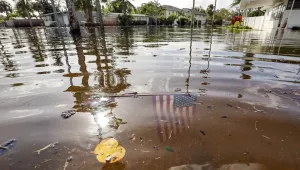Memo in report Confrontation or Collaboration? Congress and the Intelligence Community
This originally apeared as an Issue Memo (pp. 82-85) in the report Confrontation or Collaboration? Congress and the Intelligence Community, a publication of The Intelligence and Policy Project of Harvard Kennedy School's Belfer Center for Science and International Affairs.
Over the past seven years, the Intelligence Community has focused its resources and attention on counterterrorism and support to ongoing military operations in Iraq and Afghanistan. Yet, volatile energy prices and the geopolitics of energy supply have rendered the United States more vulnerable than any time in past decades. Policymakers, including members of Congress, now recognize the need for the Intelligence Community (IC) to devote more attention to this important national interest.
This memo provides a proposed conceptual framework for assessing energy security and the potential areas in which the Intelligence Community can support policymakers.
What is Energy Security?
This paper takes a narrow, security-focused perspective on energy security. In that light, energy security is the “provision of affordable, reliable, diverse, and ample supplies of oil and gas… and adequate infrastructure to deliver these supplies to market.”
Threats to Energy Security
Reliable energy inputs are crucial to U.S. national security.
- A sudden removal or disruption of energy inputs could adversely impact the U.S. economy and cause severe inflation.
- Rising fuel prices can bring windfall profits to regimes hostile to the U.S.
- Competition over scarce energy resources also has the potential to be a major source of conflict, which could directly impact supply or result in inter-state conflict.
Physical Threats to Energy Supply
Pipeline security: Most oil and natural gas pipelines run above-ground and extend over hundreds of miles, making them highly visible and difficult to protect. Pipelines are prime symbolic targets, seen as representing foreign influence and economic or political inequality.
- For example, politically motivated groups such as the Revolutionary Armed Forces of Colombia (FARC) and the Movement for the Emancipation of the Niger Delta (MEND) have attacked oil pipelines in Colombia and Nigeria, respectively.
Maritime Security: Oil and Liquified Natural Gas tankers are slow moving and rarely well-defended. Offshore platforms and ports are also vulnerable. In addition, global shipping lanes pass through narrow channels known as chokepoints, such as the Strait of Hormuz and the Bosporus Straits. An attack on, or interdiction of, a vessel in one of these chokepoints could result in closures or limits on traffic, which would seriously impact world energy supply.
- In November 2008, Somali-based pirates stunned national security experts by attacking and seizing a large oil tanker located more than 450 miles from the nearest coastline.
- Several terrorist groups, including al-Qaeda have threatened to attack oil tankers. In 2002, al-Qaeda was responsible for an attack on the Limburg, a French tanker.
Political Threats to Energy Supply
Control over the supply of energy is a major source of leverage for suppliers and transit countries.
- In January 2006, Russia cut off its supply of natural gas to Ukraine and threatened to do so again two years later. Many analysts asserted that Russia’s actions were a politically motivated response to Ukraine’s tilt towards the West.
- Both Iran and Venezuela have threatened to limit their oil production in the past year for political reasons.
The U.S. has sought to reduce the risk of such manipulation by supporting projects that involve U.S. allies, such as the Nabucco gas project in Central Asia, and opposing those that do not, such as the India-Pakistan-Iran gas pipeline.
World Energy Reserves
Energy suppliers do not always provide consistent or accurate information about their reserves. Yet policymakers and U.S. companies need this information to develop long-term energy policy and investments.
- Saudi Arabia, for example, often overstates or withholds its future production capabilities and plans. The rate of decline of the world’s biggest oil field, Ghawar, as well the potential for the massive Khurais field, are both contested.
The Intelligence Community: Bolstering U.S. Energy Security
Addressing the challenge of energy security now and in the future will require the United States to utilize all instruments of national power, including using the IC. The IC could bolster support to policymakers and U.S. energy security in the following ways:
Strategic Look
The National Intelligence Council could complete a comprehensive National Intelligence Estimate on energy security that assesses the most vulnerable aspects of the infrastructure critical to delivering global energy supplies and the future stability of major energy suppliers.
Physical Threats
Pipeline Security: The IC is well-suited to gather information on the motivations and capabilities of groups who may attack targets crucial to the supply of oil and natural gas.
The ability of states to prevent and respond to attacks is also a fundamental aspect of energy security. Colombia, for example, found that a quick response by the government greatly reduced the effect of attacks on its energy. Intelligence officers could improve protection of facilities and contingency plans.
- The National Geospatial Intelligence Agency, for example, provided analysis of commercial imagery data on oil pipelines under construction and in operation in Russia and the Caucasus. The information was used to track the progress and security of the oil pipeline projects.
- Ideally, the government could work closely with the private sector to protect critical infrastructure.
Maritime Security: A GAO report in March 2007 critiqued the lack of information on the repercussions of an LNG tanker attack. The IC could provide such valuable analysis.
- The 2005 National Strategy for Maritime Security also noted the centrality of intelligence collection and analysis in maritime security. The Strategy described the importance of improving sensor technology and information processing tools, human intelligence and cooperation between domestic agencies and with our allies.
Political Threats
The IC could monitor decision-making circles in countries that have the power to impact U.S. energy security. Collection targets could include oil ministries, traditional targets, such as the office of the head of state, or informal/private loci of power.
World Energy Reserves
To address our longer-term energy security, the IC could gather information on the status of the world’s oil fields. This information would enable policymakers and experts to produce a timeline for developing alternatives and prepare for the possibility of unexpected energy shortages.
Sources
Butts, Kent Hughes and Arthur L. Bradshaw Jr. "Military Education Workshop Addresses Threats to Stability and Security." Issue Paper, Center for Strategic Leadership, U.S. Army War College, Aug 2007, Vol. 8-07.
"NIC Chairman: Intelligence Challenges Through 2015." Remarks by John C. Gannon, Chairman, National Intelligence Council to the Columbus Council on World Affairs, 27 April 2000.
Central Intelligence Agency Support to National Policy. 2009. Central Intelligence Agency. Accessed 19 March 2009 https://www.cia.gov/library/reports/archived-reports-1/Ann_Rpt_2003/snp.html.
CFR, National Security Consequences of U.S. Oil Dependency, Independent Task force report No. 58, 2006.
Climate Change NIE study commissioned by NIC done through the Columbia University Center for International Earth Science Information Network (CIESIN) 19 March 2009 http://www.ciesin.columbia.edu.
Congressional Record: Senate Statements on Introduced Bills and Joint Resolutions. 13 June 2007. 19 March 2009 http://www.fas.org/irp/congress/2007_cr/s1613.html.
Dreyfuss, Robert. "Company Spies." Mother Jones, May/June 1994. 19 March 2009. http://www.motherjones.com/politics/1994/05/company-spies.
Kalicki, Jan H. and David L. Goldwyn (eds.) Energy & Security: Toward a New Foreign Policy Strategy. Johns Hopkins University Press, 2005.
Mapping the Global Future: Report of the National Intelligence Council's 2020 Project. 19 March 2009. http://www.dni.gov/nic/NIC_2020_project.html.
National Intelligence Council. 2009. National Intelligence Council. 19 March 2009. http://www.dni.gov/nic/NIC_home.html.
Office of the Director of National Intelligence. 2009. Office of the Director of National Intelligence. 19 March 2009. http://www.dni.gov.
Riley, Sheila. "Cyber rules guard grid." Electronic Engineering Times 4 February 2008.
Weighing Intelligence for Smarter Energy Act (WISE Act) S.1613, 2007.
Read and download the full report:
Confrontation or Collaboration? Congress and the Intelligence Community
Download this memo:
Rosenbach, Eric and Aki Peritz. "The National Interest, Energy Security, and the Intelligence Community." Memorandum, "Confrontation or Collaboration? Congress and the Intelligence Community," Belfer Center for Science and International Affairs, Harvard Kennedy School, July 2009.







